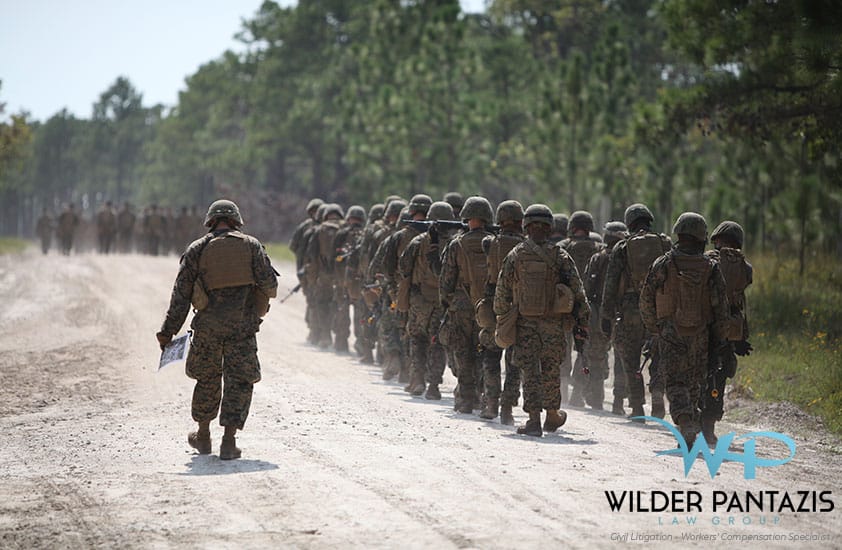
Wilder Pantazis Law Group is available to individuals and families affected by the exposure to contaminated water at Camp Lejeune and is also open to collaborating with out-of-state firms helping these victims.
You may have seen one of the many commercials on television recently talking about contaminated drinking water at the Marine Corps base at Camp Lejeune, North Carolina. It has come to light that the drinking water was contaminated with dangerous chemicals for more than 30 years, which may have led to numerous illnesses—some including cancer.
Now, a new law is opening the door to individuals who were exposed to these harmful contaminants and may offer financial restitution.
What is the Camp Lejeune Justice Act of 2022?
The Camp Lejeune Justice Act of 2022 was signed into law on August 10, 2022. This law provides military veterans, their families, and civilians who lived or worked at Camp LeJeune from August 1, 1953, through December 31, 1987, the ability to initiate a lawsuit against the United States Government due to exposure to contaminated water.
During that time, it’s estimated that over one million military veterans and their families working and living at the base were exposed to contaminated water.
It was determined through extensive testing that the Camp Lejeune drinking water was primarily contaminated with elevated levels of trichloroethylene (TCE), tetrachloroethylene (PCE), benzene, and vinyl chloride that were beyond the maximum level allowed by the federal government. This contamination was primarily caused by leaks of dry-cleaning materials, degreasers, and nearly seventy other dangerous chemicals underground.
This new law will not affect any individual’s veteran disability or medical benefits. Instead, any benefits previously received may simply act as an offset to any settlement award obtained or judgment awarded.
Who may qualify for compensation under the Camp Lejeune law?
This act allows for anyone exposed on the base between August 1, 1953, and December 31, 1987, to file a claim. This includes veterans, family members, and anyone who worked on the base for a period of 30 days or more. The law also allows for family members to bring wrongful death claims for any individuals who may otherwise qualify for compensation.
What is the statute of limitations for Camp Lejeune victims?
This act allows those individuals who meet the requisite criteria a period of 2 years from August 10, 2022, to file a claim. Therefore, all claims must be initiated on or before August 10, 2024, to comply with the requisite statute of limitations. This makes it extremely important for you or a family member who may qualify for compensation under this new law to consult with an attorney promptly to have your claim reviewed.
What cancers and illnesses are linked to Camp Lejeune?
The contaminated water at Camp Lejeune from August 1, 1953, through December 31, 1987, may be linked to the following cancers and illnesses:
- Esophageal cancer
- Lung cancer
- Breast cancer
- Bladder cancer
- Kidney cancer
- Leukemia
- Multiple myeloma
- Myelodysplastic syndromes
- Renal toxicity
- Hepatic Steatosis
- Female Infertility
- Miscarriage
- Scleroderma
- Neurobehavioral effects
- Non-Hodgkin’s lymphoma
- Hodgkin’s lymphoma
- Prostate cancer
- Rectal cancer
- Pancreatic cancer
- Multiple sclerosis
- Birth defects
Additional types of cancers and illnesses are being studied in the Camp Lejeune Justice Act litigation and may be added to the list above in the near future.
What types of contaminants were Camp Lejeune veterans and their families exposed to?
The following contaminants have been identified in Camp Lejeune drinking water:
- Benzene
- Tetrachloroethylene (PCE)
- Trichloroethylene (TCE)
- Vinyl chloride
It’s possible there were other chemicals in the drinking water, but the list above contains the current known ones. These contaminants have a maximum contamination level in drinking water, and when they’re found in higher concentrations than what is safe, the federal government recognizes their risks for causing diseases like cancer increases in humans. The max level for PCE and TCE is 5 parts per billion.
It’s believed that the acceptable level of contamination for TCE and PCE was exceeded sometime in 1953 and continued at Camp Lejeune through the mid-1980s. A 2017 government report showed that TCE contamination levels in the drinking water at the Hadnot Point water treatment plant hit 1,400 parts per billion in the early 1980s—a level that is 2,800 times the acceptable level of contamination. This water treatment plant was the primary source of drinking water for most Camp Lejeune barracks and workspaces.
Process for filing Camp Lejeune claims
Under this new law, these claims will initially need to be filed through an administrative process as a condition precedent to filing a lawsuit. This will require the filing of an administrative form with the Navy Tort Claims Unit (TCU).
Should the matter not resolve through that administrative process, or if the federal government fails to act, then the individual claimant will have the opportunity to initiate a lawsuit in the Eastern District of North Carolina, which is the exclusive jurisdiction for these claims to be filed. Wilder Pantazis Law Group has attorneys admitted to practice in the EDNC, and they are ready and able to handle these claims.
At the Wilder Pantazis Law Group, the right resolution and outcome for you and your family is always our top priority. We’re 100% dedicated to providing the highest quality of legal services in the areas of workers’ compensation, personal injury, car crashes, and complex civil litigation.
